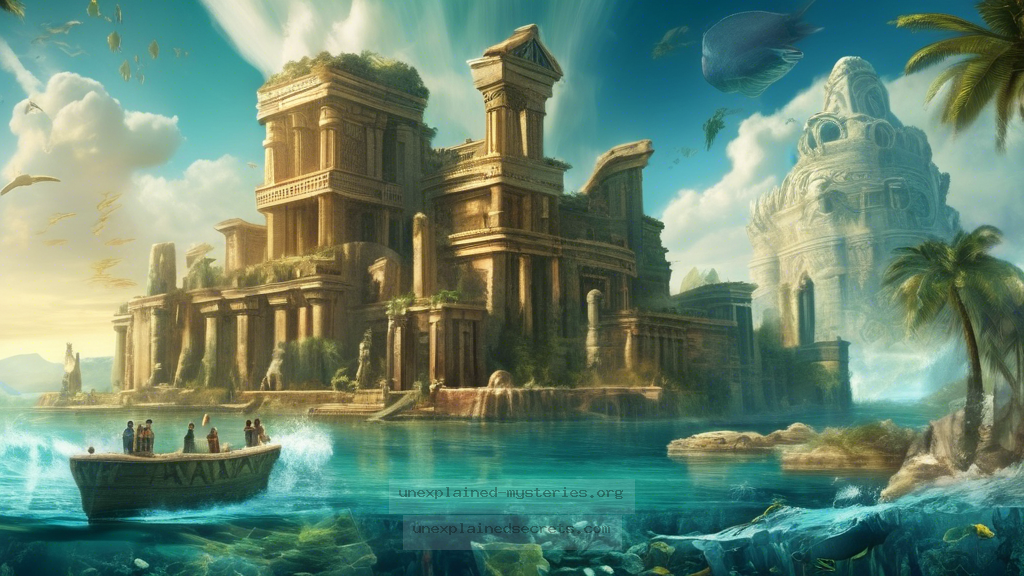What Happened to the Lost City of Atlantis: Fact, Fiction, or Forgotten History?
What Happened to the Lost City of Atlantis: Fact, Fiction, or Forgotten History?
The myth of Atlantis has captivated historians, archaeologists, and curious minds for centuries. As one of the most enduring legends of the ancient world, the story of a highly advanced civilization that mysteriously vanished beneath the waves raises profound questions about humanity’s past. But what if Atlantis was more than just a tale spun by Plato? What if it holds a kernel of truth about a real lost city? This post delves into the enigma of Atlantis, exploring its historical context, core concepts, practical implications, alternative perspectives, and ongoing research to understand whether it is a mere myth or a forgotten chapter of human history.
Historical Context of Atlantis
The first recorded mention of Atlantis comes from the works of the ancient Greek philosopher Plato, specifically in his dialogues “Timaeus” and “Critias,” written around 360 BCE. In these texts, Plato describes Atlantis as a powerful and advanced civilization that existed about 9,000 years before his time. He painted a picture of a prosperous island located beyond the Pillars of Hercules (modern-day Strait of Gibraltar), which ultimately succumbed to catastrophic natural disasters, leading to its submersion beneath the ocean.
Plato’s narrative has sparked debates among historians regarding its authenticity. Some scholars argue that Atlantis may have been a fictional allegory created by Plato to illustrate his philosophical ideas about ideal societies and the dangers of hubris. Others propose that Plato’s account could be based on real historical events, particularly the destruction of the Minoan civilization on the island of Santorini around 1600 BCE. The abrupt collapse of this advanced society, possibly due to volcanic eruptions and tsunamis, bears resemblance to Plato’s description of Atlantis.
Core Concepts and Theories about Atlantis
Several theories have emerged regarding the potential location and nature of Atlantis. Among the most notable are:
- Geological Theories: Some researchers have posited that Atlantis may have been located in areas prone to geological upheaval, such as the Mediterranean or the Caribbean. The island of Santorini, with its massive volcanic eruption, is frequently cited as a possible candidate.
- Mythological Interpretations: Others argue that Atlantis is purely a myth, serving as a moral lesson about the consequences of excessive pride and ambition.
- Global Flood Theories: Some believe that the Atlantis myth may correlate with various flood stories found in different cultures worldwide, suggesting a shared memory of a significant historical event.
Practical Implications and Evidence
Despite the lack of concrete evidence, archaeological findings have provided intriguing insights that lend some credence to the idea of a lost advanced civilization. The discovery of ancient sites such as Göbekli Tepe in Turkey, which predates Stonehenge by thousands of years, challenges previously held assumptions about the timeline of human civilization. Such findings suggest that advanced societies may have existed long before we have recorded history.
Additionally, submerged structures off the coasts of various countries, including Japan and Cuba, have sparked interest among archaeologists and treasure hunters alike. Some of these underwater ruins exhibit architectural features that resemble those described in Plato’s works, leading to speculation that they could be remnants of Atlantis or similar lost civilizations.
Alternative Perspectives on Atlantis
While many continue to search for Atlantis, alternative perspectives challenge the traditional narrative. Some scholars argue that the obsession with finding Atlantis reflects a broader human desire to uncover lost knowledge and understand our origins. This quest for validation can cloud scientific inquiry and lead to sensationalized claims.
Moreover, the idea of Atlantis as a “perfect” civilization often overlooks the complexities of social dynamics and governance in ancient societies. This romanticized view can result in a distorted understanding of human history, where the focus is placed on idealized cultures rather than the messy realities of human existence.
Historical Accounts and Documented Cases
Throughout history, various accounts have contributed to the legend of Atlantis. The writings of ancient historians such as Herodotus and Pliny the Elder include references to lost civilizations, often drawing parallels to Plato’s descriptions. Additionally, the Roman author Lucian of Samosata wrote a satirical piece titled “True History,” in which he humorously references Atlantis, further embedding it into the cultural consciousness.
In modern times, numerous expeditions and explorations have sought to locate Atlantis. One notable figure is archaeologist Frank Joseph, who proposed that the civilization might have been located in Antarctica, based on claims of ancient maps suggesting a landmass beneath the ice. This theory, while controversial, illustrates the lengths to which researchers have gone to uncover the truth.
Best Practices for Investigation or Study
For those intrigued by the mystery of Atlantis, several best practices can enhance investigation and study:
- Cross-Disciplinary Approach: Combine insights from archaeology, geology, anthropology, and mythology to develop a well-rounded understanding of the topic.
- Critical Evaluation: Approach sources critically, distinguishing between credible research and sensationalized claims. Peer-reviewed journals and reputable publications should be prioritized.
- Field Research: Engage in fieldwork, if possible, to observe archaeological sites and geological formations firsthand.
Future Developments and Ongoing Research
The search for Atlantis continues to inspire new research and exploration. Advances in underwater archaeology, remote sensing technology, and geological surveying are opening new avenues for investigation. For example, the use of sonar and submersibles allows researchers to explore underwater landscapes that were once inaccessible, potentially revealing new evidence of ancient civilizations.
Moreover, the increasing interest in climate change and its impact on coastal cities draws parallels to the story of Atlantis. Understanding how rising sea levels might have influenced past societies can provide valuable insights into humanity’s resilience and adaptability.
Conclusion: The Enigma of Atlantis
The mystery of Atlantis remains one of the most fascinating enigmas in human history. While the tale may blur the lines between fact and fiction, its impact is undeniable. From ancient philosophers to modern archaeologists, the search for Atlantis continues to evoke curiosity and inspire exploration. As we delve deeper into our past, we may uncover truths that challenge our understanding of civilization and its potential.
In the end, whether Atlantis was a real place or a cautionary tale, its legacy urges us to reflect on our own societies and the lessons of history. The allure of the lost city lies not just in the quest for its location but in the eternal human desire to seek knowledge about our origins and place in the world.
Other Articles
Recent Posts
- What Happened to Flight MH370? The Conspiracy Theories That Still Haunt Us
- What Secrets Lurk Within the Walls of the Infamous Trans-Allegheny Lunatic Asylum?
- What Evidence Supports the Existence of Bigfoot in the Pacific Northwest?
- What Happened to the Indus Valley Civilization? Unraveling the Mysteries of Ancient Urban Life
- Can Telepathy Be Scientifically Proven Through Laboratory Evidence?







